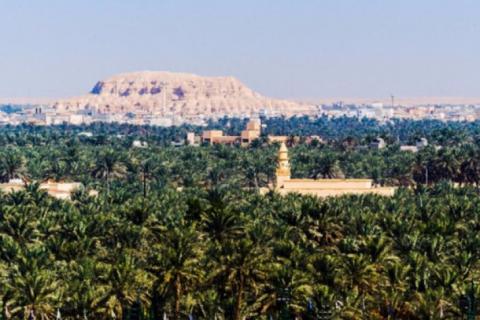Saudi lauds Indonesia's support to make Al-Ahsa Oasis world heritage
Sabtu, 7 Juli 2018 | 04:02 WIB
The Saudi Arabian government has lauded its Indonesian counterpart`s support for Al-Ahsa Oasis being successfully nominated as a world heritage site by the United Nations Educational, Science, and Cultural Organization (UNESCO), Antara news agency reported.
The recognition and acknowledgment was conveyed by Prince Sultan bin Salman bin Abdulaziz Al Saud, as president of al-Hai'ah al-Amah li as-Siyahah wal Turas al-Watany, or the National Tourism and Heritage Agency of Saudi Arabia, to Ambassador of the Republic of Indonesia to the Kingdom of Saudi Arabia Agus Maftuh Abegebriel via a phone call recently.
"Indonesia's support to make Al-Ahsa Oasis a world heritage site was presented during the 42nd Session of the World Heritage Committee held in Manama, Bahrain, from June 24 to July 4, 2018. Al-Ahsa Oasis is a natural site located in the eastern region of Saudi Arabia, which according to archaeological research, has been around for centuries before Christ," Ambassador Abegebriel said.
The ambassador explained that the Indonesian delegation and the 20 member countries of the most prestigious committee approved Al-Ahsa Oasis to be included on the UNESCO's World Heritage List. The Indonesian delegation was led by Hotmangaradja Pandjaitan, who is also ambassador extraordinary plenipotentiary of Indonesia to France and the permanent representative of Indonesia to the UNESCO.
Al-Ahsa Oasis is located in Eastern Saudi Arabia. Freshwater springs have emerged in this area since thousands of years ago, making it a home for prehistoric humans.
In addition to Al-Ahsa Oasis, several of Saudi's historical sites have been listed on the UNESCO World Heritage list, one of which is Madain Saleh that is the first site recognized by UNESCO in 2008.
Other world heritage sites in Saudi Arabia are At-Turaif District in Dir'iyah that was listed in 2010, Historic Jeddah or Gate to Makkah or Baabul Makkah that was listed in 2014, and rock art or the ancient painting in Ha`il listed in 2015.
Ambassador Abegebriel noted that of all historical heritage sites in Saudi Arabia, Madain Saleh is the most controversial one, as it is believed to be the city of the Thamud people, who were cursed and condemned by God for their disobedience.
Several Saudi conservative Islamic clerics forbid people from visiting this site. However, after a comprehensive review, the Government of Saudi Arabia opened the Madain Saleh area as a tourist destination.
"We have visited this site aboard a special aircraft provided by the Kingdom of Saudi Arabia and watched from up-close the rock mountains that are carved similar to those found in Petra, Jordan. However, the carving here is not so much in order," the ambassador stated.
He added that a well in Madain Saleh is believed to be the place where Prophet Saleh`s camel had quenched its thirst. The prophet lived in about 3,000 BC.
"The nomination for being declared as a world heritage is a huge jump in the history of Saudi civilization, which is a start to move from the rigid-textual interpretation to a moderate understanding," Abegebriel emphasized.
During a conversation with Prince Sultan, who is the second son of King Salman and also the first Saudi astronaut, the ambassador asserted that Indonesia is ready to cooperate with Saudi in maintaining such world heritage sites.
Ambassador Abegebriel, who is also a lecturer at the Indonesian State Islamic University Sunan Kalijaga, Yogyakarta, assured Prince Sultan that Indonesia has experience in conservation and preservation of ancestral cultures, such as the Borobudur Temple and Prambanan Temple, which have long been included on the UNESCO`s World Heritage list.
Saudi Arabia's commitment to maintain ancient sites, as the outcome of past civilizations, was also confirmed by Crown Prince Mohammad bin Salman, who is the younger brother of Prince Sultan bin Salman.
"The Crown Prince is serious in campaigning for moderate Islam and holding dialog with civilizations of all nations," Abegebriel remarked.
In addition to the ancient sites, the old markets from the Age of Ignorance, which were built before the Islamic civilization, have also become tourist destinations. The Age of Ignorance or "jahiliyyah" era, about before 610 AD, is the era before the first revelation of Prophet Muhammad (peace be upon him).
One of the markets that has long been ignored is Souq Ukaz or Ukaz market, which was a popular market during the Time of Ignorance, especially among poets.
"Next week, using the Royal aircraft facility, if God willing, we will visit the cultural city of Souq Ukaz located in Thaif," the ambassador stated. (Masdar)




